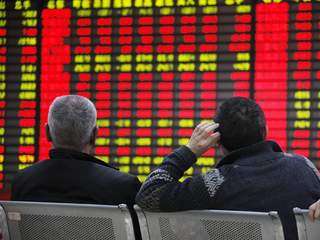 Asian Stocks Drop as Yen Strengthens Ahead of U.S. Data
Asian Stocks Drop as Yen Strengthens Ahead of U.S. Data
Asian stocks fell after the yen strengthened and valuations on the regional equities gauge climbed to a six-month high, with investors awaiting U.S. job data this week that may provide further evidence as to when the Federal Reserve will reduce stimulus.
Toyota Motor Corp., Asia’s largest carmaker, sank 1.3 percent as Japan’s Nikkei 225 Stock Average retreated from a six-year high. Toppan Printing Co. lost 6.5 percent in Tokyo after saying it will sell 80 billion yen ($781 million) of convertible bonds. Speco Co. surged 8.4 percent, leading South Korean defense firms higher after two lawmakers said North Korean leader Kim Jong Un’s uncle Jang Song Thaek may have been dismissed as vice chairman of the National Defense Commission.
The MSCI Asia Pacific Index slid 0.8 percent to 140.66 as of 11:12 a.m. in Hong Kong, with all 10 industry groups on the gauge falling. More than $8 trillion has been added to the value of global equities this year, the most since 2009, as central banks took steps to shore up economies worldwide. Fed policy makers meet Dec. 17-18 after minutes of their last meeting in October showed they may reduce $85 billion of monthly bond buying should the U.S. economy improve as they anticipate.
“Valuations have made equities, along with precious metals, the asset class most vulnerable to the early stages of a change in monetary policy,” Ric Spooner, Sydney-based chief market analyst at CMC Markets, said in an e-mail. “Buyers are becoming circumspect at current valuations and are prepared to wait for pullbacks before adding to portfolios.”
Regional Gauges
The MSCI Asia Pacific Index gained 9.6 percent this year through yesterday as central banks boosted stimulus to support growth globally and China’s economy showed signs of stabilization. The gauge traded yesterday at 14 times estimated earnings, the highest level since May, compared with multiples of 16.2 for the Standard & Poor’s 500 Index and 14.9 for the Stoxx Europe 600 Index, according to data compiled by Bloomberg.
Japan’s Topix index lost 1.5 percent after the yen yesterday snapped a four-day slide. The Nikkei 225 retreated 2.1 percent as Toyota fell 1.3 percent to 6,310 yen.
Australia’s S&P/ASX 200 Index advanced 0.2 percent as traders increased bets for an interest-rate cut after a report showed the nation’s economy grow less than economists forecast last quarter. Trader are pricing in a 22 percent chance of a quarter percentage point cut at the central bank’s next meeting in February, compared with 17 percent earlier.
South Korea’s Kospi index dropped 0.6 percent and New Zealand’s NZX 50 Index fell 1.2 percent. Futures on the S&P 500 Index added 0.1 percent.
Hong Kong
Singapore’s Straits Times Index dropped 0.1 percent and Taiwan’s Taiex index added 0.5 percent. Hong Kong’s Hang Seng Index lost 0.3 percent and China’s Shanghai Composite Index advanced 1.7 percent. The Hang Seng yesterday retreated from a 2 1/2-year high as brokerages dropped after a China’s services gauge fell.
The Commerce Department will release data tomorrow on new U.S. home sales and the central bank will publish its Beige Book, which provides policy makers anecdotal accounts of business activity from the Fed districts. Reports on third-quarter gross domestic product and November non-farm payrolls are also due this week.
U.S. employers probably hired 181,000 workers in November after adding 204,000 in October, according to a Bloomberg News survey of economists before the Labor Department report Dec. 6.
Pacific Investment Management Co.’s Bill Gross, manager of the world’s biggest bond fund, said the unprecedented cash added to the financial system by central banks is raising the risk of a slide in global asset prices.
‘Dangerous Game’
“Investors are all playing the same dangerous game that depends on a near-perpetual policy of cheap financing and artificially low interest rates in a desperate gamble to promote growth,” Pimco’s Gross wrote in his monthly investment outlook posted on Newport Beach, California-based Pimco’s website.
The yen has tumbled 14 percent this year, the biggest decline among 10 developed-nation currencies tracked by Bloomberg Correlation-Weighted Indexes.
In that time, Bank of Japan Governor Haruhiko Kuroda helped drive a 47 percent surge in Japan’s Topix by maintaining monetary easing as he and Prime Minister Abe sought to jolt the nation out of 15 years of deflation. The Topix is the best performing of 24 developed markets tracked by Bloomberg, on course for its biggest annual advance since 1999.
Westfield Group surged 3.2 percent to A$10.69 in Sydney after Australia’s biggest mall operator said it plans to split its domestic and international operations, expanding a separation of assets that began three years ago.
China Outlook
Chinese President Xi Jinping said the environment for economic and social development next year isn’t optimistic, in a signal that leaders may be willing to accept slower growth in 2014.
“While the overall situation is good, the environment for economic and social development next year is not optimistic,” Xinhua said, paraphrasing remarks made by Xi. He said reform should be integrated into all sectors.
China may set its 2014 gross domestic product growth target at 7 percent, down from 7.5 percent this year, the Economic Information Daily said yesterday, citing research groups.
Toppan Printing lost 6.5 percent to 787 yen in Tokyo, the most in more than 2 1/2 years, after yesterday announcing a convertible bond issue.
South Korean defense companies advanced as two lawmakers said they believe North Korean leader Kim Jong Un may have fired his uncle and de facto deputy Jang Song Thaek.
Speco climbed 8.4 percent to 3,875 won. Firstec Co. gained 3.1 percent to 1,845 won and Victek Co. surged 5.1 percent to 1,655 won. The removal of Jang may indicate that Kim is still trying to solidify his grip on power by purging top officials who gained prominence under his father Kim Jong Il, who died of a heart attack in 2011.










Add comment